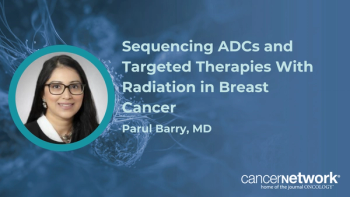
Oncology NEWS International
- Oncology NEWS International Vol 12 No 3
- Volume 12
- Issue 3
Adding Carboplatin Step Ups Response in HER2/neu-Positive Breast Cancer Patients
FAIRFAX, Virginia-In women with HER2/neu-positive advanced breast cancer, augmenting trastuzu-mab (Herceptin)/paclitaxel with carboplatin (Paraplatin) provides superior response and time to progression, results of a randomized phase III trial suggest. The response rate was 52% for patients who received trastuzu-mab/paclitaxel/carboplatin (TPC), significantly higher (P = .04) than the 36% response rate for trastuzumab/paclitaxel (TP). Time to progression was 11.2 months for TPC, vs 6.9 months for TP (P = .007). Investigator Nicholas J. Robert, MD, chairman of the US Oncology Breast Committee, Fairfax, Virginia, presented the results.
FAIRFAX, VirginiaIn women with HER2/neu-positive advanced breast cancer, augmenting trastuzu-mab (Herceptin)/paclitaxel with carboplatin (Paraplatin) provides superior response and time to progression, results of a randomized phase III trial suggest. The response rate was 52% for patients who received trastuzu-mab/paclitaxel/carboplatin (TPC), significantly higher (P = .04) than the 36% response rate for trastuzumab/paclitaxel (TP). Time to progression was 11.2 months for TPC, vs 6.9 months for TP (P = .007). Investigator Nicholas J. Robert, MD, chairman of the US Oncology Breast Committee, Fairfax, Virginia, presented the results.
Toxicity of the regimen is "acceptable," with no increase in incidence of febrile neutropenia vs trastuzumab/paclitaxel, according to Dr. Robert. "Adverse event profiles are comparable between the two treatment groups, except there is a greater incidence of neutropenia and thrombocytopenia in the TPC group."
Builds on Pivotal Trial
Dr. Robert noted that this investigation builds on the pivotal phase III trial showing TP is significantly superior to paclitaxel alone in HER2/neu-positive breast cancer (N Engl J Med 344:783-92, 2001). In that trial, response rate was 41% for TP, vs 17% for paclitaxel alone (P < .001), while time to progression was 6.9 months for TP and 3.0 months for paclitaxel alone (P < .001).
"In our trial vs the pivotal trial, there has been a stepwise improvement in the case of patients with HER2/neu-positive disease. When carboplatin is added to this combination, the response rate increases to 52%, and time to progression is now 11.2 months," Dr. Robert said (see
Suspect Increased Synergism
A somewhat higher response rate was noted in patients with immunohistochemistry (IHC) high-positive status (3+), a group in which investigators "may suspect an increased synergism between trastuzumab, paclitaxel, and carboplatin" due to overexpression of HER2/neu, Dr. Robert said. Among IHC 3+ patients who received TPC, response rate was 57%, vs 37% for TP; time to progression was 13.6 months for TPC vs 7.2 months for TP.
The trial included 196 women (median age 55 years) with stage IV breast cancer overexpressing HER2/neu (2+ or 3+ by immunohistochemistry, approximately two-thirds IHC 3+ status) and Eastern Cooperative Oncology Group (ECOG) performance status 0 to 2. Patients could not have had prior chemotherapy for metastatic disease.
The TP regimen was similar to that used in the prior pivotal trial and included paclitaxel 175 mg/m2 every 3 weeks and trastuzumab until disease progression. The TPC arm included the same TP regimen plus carboplatin at an area under the concentration-time curve (AUC) of 6 every 21 days.
Upward Survival Trend
Although it was too early at this meeting to give a final survival analysis, Dr. Robert said there was a trend toward improved survival (P = .02) at 12 months, continuing to 24-month and 36-month evaluations.
Incidence of grade 4 neutropenia was 36% in the TPC arm and 12% in the TP arm, while thrombocytopenia was seen in 9% of TPC patients vs 1% of TP patients. "With the addition of carboplatin, one might expect more myelosuppression, and that’s what we found," Dr. Robert said. "However, in terms of complications, this did not translate into an increase in febrile neutropenia (5% vs 4%)."
Likewise, incidence of neuropathy, nausea, arthralgias and other adverse events were similar between groups. One patient developed congestive heart failure on the TP arm.
Articles in this issue
almost 23 years ago
Elevated Serum HER2/neu Linked to Lower Response to Hormone Therapyalmost 23 years ago
Are We Closing in on a Blood Test for Breast Cancer?almost 23 years ago
Trial Lays Groundwork for All-Oral Capecitabine/Vinorelbinealmost 23 years ago
Idarubicin Paired With Capecitabine as Entirely Oral First-Line Treatmentalmost 23 years ago
Fulvestrant Is Effective for Patients Failing Other Hormonal Therapyalmost 23 years ago
Double Transplant Increases Survival in Myeloma Patientsalmost 23 years ago
Smoking Worsens Prognosis in Cervical Cancer PatientsNewsletter
Stay up to date on recent advances in the multidisciplinary approach to cancer.





































